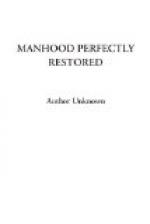The characteristic symptoms of partial impotency are: an imperfect erection, or, if the erection is sufficiently vigorous, it is of too short a duration, and the vital fluid is discharged prematurely.
The erector muscles become paralyzed, and the organ remains inactive at the call of the will.
The person thus afflicted is greatly embarrassed and mortified at his paralytic condition. That buoyancy of spirit is gone; the snap, vim and vigor that once held sway has departed—and why? Because that great motive power (amativeness) that gives the push and go-aheaditiveness is checked, or rather, ceases to act.
THE CURABILITY OF SPERMATORRHOEA AND IMPOTENCY.
Having before us the records of some three thousand cases, grave, simple and severe, that have come under our treatment in this country, as well as the printed copies of the +French Hospital Reports+, and +Civiale’s Works+, in which he minutely reviews all phases of this complaint, illustrating them with cases from his own practice, we feel justified in assuring our readers that almost any case can be cured, provided +thoroughness+ is the maxim of treatment.
The method of Profs. +Jean Civiale+ and +Lallemand+, as now perfected and extended by us, and so justly named after +Civiale+, stands unrivaled in its +success+ as well as its +simplicity+ and +reasonableness+. To all such as suffer from this harassing complaint we commend, first, a careful reading of the history of this discovery and the eminent medical men and hospitals that endorse it; and, second, a fair trial of these remedies, no matter how +hopeless+, +despondent+ and +despairing+ you may be. (See page 55.)
Although the advertising and spreading, and the ringing to full perfection of this treatment is really due to us and our physicians, still we feel in duty bound to always keep in view the two great French surgeons who first discovered the method of +intra-urethral medication+.
CHAPTER V.
IMPOTENCY OR LOST POWER.
Scarcely a day passes that we do not have some patient inquiring +"What is Impotence?"+—+"Are Impotence and Spermatorrhoea the same Disease?"+
+Impotency+ (from the Latin words im [not] and potens [to be able] means a condition of the Sexual Organs in which a man is not able to beget his species. It may be because he has lost his erectile power (and this is how it is most commonly understood), or because he has lost all desire, or lastly, because the +vital fluid+ has become so +weakened+ and +degenerated+ as to have lost its +procreative power+.
Impotence is most common in men past middle age. It may come on as the second or third stage of Spermatorrhoea, or it may develop slowly or suddenly without any symptoms of Spermatorrhoea. It may be accompanied by various +nervous+ and +exhausting+ symptoms, or these may be wholly absent. If vital fluid is being lost, and the Impotence is due to the weakness thus caused, +nervous exhaustion+ is sure to come sooner or later.




